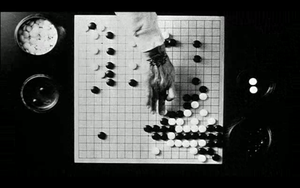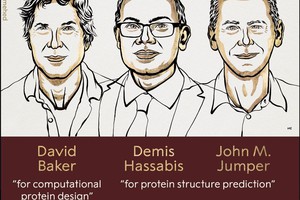It’s apparent that we’re living in the future, but how did we get here? Moreover, who shepherded us into this bold new world? Director Greg Kohrs and producer Gary Krieg sought this very answer and it brought them to Demis Hassabis.
Demis Hassabis began his journey as a young chess prodigy before shifting gears toward changing the world. He was drawn to the game as a “A fun thinking game,” but after a particularly long battle at a world tournament, he saw a futility in wasting his brain on games when there were real challenges to which he could apply his talents.
During a gap year between high school and college, Demis got an internship at Bullfrog games, where he implemented rudimentary AI into a PC game called Theme Park. His innovation allowed the NPCs to react to each other as well as the gamers’ intervention and create a more interconnected and immersive experience. This caught the eye of Electronic Arts and changed the trajectory of video games for years to come. Despite this transformative influence, Demis focused on college and after graduation sought to tackle the issue of Artificial General Intelligence.
For the uninitiated, Artificial General Intelligence refers to a true thinking creation. Inspired to a point by the AI Deep Blue defeating Chess master Kasparov in 1997, Demis was duly impressed by the victory but saw the limitation of an innovation that could ONLY play chess. As admirable as that was, Demis saw an imminent future where an AI could beat the world’s greatest chess players AND continue to learn from every stimuli surrounding it. An artificial general intelligence - in essence, a computerized brain.
To this end, Demis founded DeepMind with colleague Shane Legg and venture capitalist Peter Thiel, which got to work immediately teaching it through cue and deep learning. The first step in learning was similar to Demis’s personal experience - games. Pong, Breakout, Chess. Early successes found DeepMind purchased by Google, then the team created AlphaGo to perfect the ancient token game, made famous by Darren Aronofsky’s PI. AlphaGo defeated the best player in Korea, then took on Ke Jie from China. Just before it looked like AlphaGo had Jie beat, China cuts the feed.

Next came AlphaZero. Rather than learning from gameplay with humans, AlphaZero was given games with no instructions and learned from itself and rewards gained from achieving objectives. The learning was exponential, so the team suggested it play Starcraft II, the real-time strategy game. Before long, AlphaZero was winning matches against ranked players around the world.
As fun as games were, Demis wanted a real challenge with real victories. With this in mind, the team at DeepMind created AlphaFold, an application that attempted to tackle the unsolvable problem of Protein Folding. Rooted in the intersection of Biology and Mathematics, Protein Folding is a science of deduction - given a string of Amino Acids, can a technician predict the shape of the protein into which it will be folded. With this intuition, one can reverse-engineer viruses into vaccines, and perhaps in an even more exciting application, “This knowledge is vital to uncovering their function in cancer cells and importantly, how they can be targeted and treated.”
DeepMind entered AlphaFold into CASP, the Clinical Assessment of Structure Prediction, which presents teams with Amino Acid sequences and challenges them to predict the folded protein, grading them on accuracy to the existing proteins. During the Pandemic, AlphaFold won the CASP challenge with an unheard of accuracy over 90%, prompting the scientific community to declare the problem solved. In celebration of this, the team at DeepMind used AlphaFold to unfold 200 million proteins and release the results for free to the scientific community. This act won the team the Nobel Prize in Chemistry in 2024.
Director Greg Kohs didn’t know for sure his subject would win the Nobel Prize when he began filming Demis back in 2016, but he had some intuition toward it. That intuition didn’t come to his aid when he passed on directing JOE DIRT back in 2000, but he learned his filmmaking credo from his first subject, a Neil Diamond tribute artist who went by the stage name of “Lightning” - “Relax, we’ll get there faster by going slower.”
Intuition has benefited Greg Kohs several times in his career - the documentary just mentioned, SONG SUNG BLUE, has been adapted into a feature film by director Craig Brewer (HUSTLE & FLOW) starring Hugh Jackman and Kate Hudson. A feature script from John Sayles (THE BROTHER FROM ANOTHER PLANET, PASSION FISH) is making the rounds based off another of his documentaries, THE GREAT ALONE, about cancer-survivor and 4-time Iditarod champion Lance Mackey. Maybe Greg Kohs is living in the future, too.
THE THINKING GAME is the story of a man’s unending fascination with questions and answers, of thinking and solving, and of the complexity of the world’s mysteries distilled into a simple game. I spoke with Greg and Gary this past Wednesday ahead of the film’s release this coming weekend.

Eric McClanahan - I was very excited to screen this film - it came across my radar at Tribeca this past year and it’s a fascinating concept, which turned into a really fascinating documentary. My first question is for Greg: when and how did you decide to tell Demis’s story?
Greg Kohs - Well that journey began back in 2016 when Gary and myself made a film called ALPHAGO, a feature-length documentary that was on Netflix and now is free on YouTube. That film, while making it, was our first introduction to Demis Hassabis. At the time, he and his team had created an algorithm to play a 3,000-year-old board game called Go and defeat the world champion. We didn’t know a lot about Demis at the time but we started to learn more and more about him and this fascinating journey that he’s been on since being a chess prodigy at the age of four. And that’s where it all began.
Eric McClanahan - Nice. So Gary, you’ve been on board this project since 2016, as well. How did you and Greg meet?
Gary Krieg - We met when previously we both had been working in commercial production. We’d worked on some Nike commercials and crossed paths that way. When this project started, I happened to be at Google Creative Lab and Dem had done some work on some AI projects. When Demis reached out to ask if there was a camera crew available to document the tournament coming up in Seoul and could the Creative Lab send anyone over, and because Greg had done work at Creative Lab, as well, we knew he was a trusted filmmaker and we should definitely document the tournament. But we should also go to London in the weeks prior to document code lock just so there’s a more complete story, and by day two in Seoul we knew there was more than a complete story here. This wasn’t just documenting an event; there’s actually a feature film here.
Eric McClanahan - What is amazing is that it sounds like you guys got into this story in medias res and discovered all this rich backstory, but there’s also a prescience to your involvement because now they’re Nobel Prize winners. Did you see the potential for this phenomenon growing to that level?

Greg Kohs - Well, interestingly, when we began filming/following AlphaGo, we took up a mission to continue documenting kind of behind the curtain at DeepMind with the different research threads that were going on, and there are many. We had full access to the lab, anywhere we wanted to go, we were cleared. We just couldn’t share with any of the other teams, like the team we were just interviewing or speaking to, because it was all very confidential. But one of those teams we encountered was this group of ragtag researchers, scientists, who were taking up this challenge to create an algorithm that would help realize the structures of proteins, or in other words, fold a protein. We had no idea what that was, but we did some research and learned that if this 50-year-old grand challenge could be solved, then for whoever solved it, it would be potentially a Nobel-worthy achievement. It was at that point on our filmmakers’ bulletin board that we added a notecard with a sharpie doodle of what looked like a medal, though we never used the word “Nobel.” We called it “ABBA,” that was our code name, because all these tech people love their code names, so our code name as “ABBA” so as not to jinx it and not let anyone know our outrageous expectation. Including Demis, too. He’d ask “What’s that card?” and we’d say “Oh, that’s ABBA.” So, yeah, we did know that if they achieve their goal it could happen; it wasn’t guaranteed but it could happen. And that was about six years before it actually did happen. It happened well within the first year we were filming.
Gary Krieg - I would add, day one of filming the AlphaFold team, though, no. [Laughs] There was no expectation that that was going to lead to a Nobel. It just seemed this insurmountable problem that it would take many, many years before they made any progress.
Greg Kohs - Yeah, there was more head-scratching filmed than anything else, the whole time.
Eric McClanahan - It is an amazing progression they’d made at DeepMind with AlphaFold, AlphaGo, and AlphaZero, which learned from itself. Speaking of learning, what was the learning curve for you as filmmakers going into a science that’s this deep? Did you feel bewildered the whole while or did you just do a lot of homework?
Greg Kohs - Well, for me, personally, I was clueless on so much of this; the science, that is. So we’d be filming and we’d hear terms and then you’d go back to your hotel room and Google it to try to figure out what was just said or you’d look over the transcript of a meeting. So, yeah, it was challenging, especially when it came to proteins. Once we learned about this team and the implications of if they were able to solve this problem, we did a deep dive. I don’t think we could have PhDs, but we tried. And we almost learned too much because our earlier cuts were way too over the heads of our test audiences. Then we had to really pare it back. But our favorite question when talking to these scientists, or way of framing a question, was always “Explain it to me like a five-year-old.” Which was just saying explain it to me so I can understand it because I felt that’s about where my brain was when talking to them. So, that was very helpful, and they worked hard with us to make it understandable. What did you think, Gary?
Gary Krieg - I would add that early on Demis said “Focus on why we’re doing it, not how we’re doing it.” As storytellers, as filmmakers, that was really attractive, because it’s about the people doing the thing as much as the thing, itself.
Eric McClanahan - Speaking of prescience, Greg you had a project that came out in 2008, SONG SUNG BLUE, that you’d originally envisioned as a scripted Hollywood juggernaut and you were laughed out of offices, but now that it is a Hollywood feature film coming out this year. And I also understand that you have a developed script for THE GREAT ALONE and you’re looking to see that realized as a narrative film. Telling me about standing at the precipice of these projects of yours about to be realized as you’d originally envisioned them.

Greg Kohs - Yeah, it’s pretty surreal. It’s exciting, SONG SUNG BLUE, in particular, was made in hopes of helping this couple that the film tells the story of; I just wanted to help them. The documentary did very well - it got attention, in its first review, from I think Aint’t It Cool News, which is really cool, back in the day, and Roger Ebert found it. Everyone kind of found it, and that really was great for the subjects of the film, Claire and Mike, but I always in the back of my mind wished I could’ve really helped them, helped them in some way live a better life. I’m so thrilled that it’s now being remade, that Craig Brewer found it, and wrote a script based on the documentary, which is very close to the film, and now they’re getting the attention and the resources that I had always hoped they would’ve gotten. So that makes me really happy. The same goes for THE GREAT ALONE, which is still in development with a wonderful script by John Sayles. You know, I’ve always been off the grid with my filmmaking - I haven’t really adapted to the industry norm, if there is one anymore, so it’s been a lot harder to do things, it’s taken longer, but as Lightning from SONG SUNG BLUE once said, “You’ll get there faster going slower.” And so I always keep that in mind. Who knows? Maybe THE THINKING GAME and Demis’ story will make it to the silver screen beyond a feature documentary one day.
Eric McClanahan - Yeah, let’s get Sorkin on the screenplay and Fincher to direct!
Greg Kohs - Yeah, we’re all for that.
Eric McClanahah - Fantastic! Well, that’s all the time we have. I really appreciate you guys talking to me and I really enjoyed the film and the opportunity to pick your brains about it and I can’t wait to see what you guys do next.
Greg Kohs - Thank you for giving it some attention. We appreciate it.
THE THINKING GAME was an official selection of the 2024 Tribeca Film Festival and will be available to stream on Friday, February 7 on Amazon, iTunes, and Google.
“The Thinking Game is a compelling feature-length documentary film that chronicles the extraordinary life of Demis Hassabis, a visionary scientist on a relentless quest to solve the enigma of artificial general intelligence (AGI).
This film delves into the creation of one of the world's most prominent AI labs, where Demis and his team made history with AlphaFold, a groundbreaking program that solved a 50-year grand challenge in biology. AlphaFold is already having a global impact by accelerating the development of revolutionary new drugs and paving the way for future advances in science.
The Thinking Game captures the exhilaration of historic breakthroughs like AlphaFold, the crushing weight of disappointment during setbacks, and the relentless pursuit of knowledge that defines Demis' unwavering commitment to scientific innovation. This film invites viewers to witness one of the most important scientific adventures of our time, exploring the potential of AGI to reshape our world.”
Until next time, take care!
-McEric, aka Eric McClanahan-
